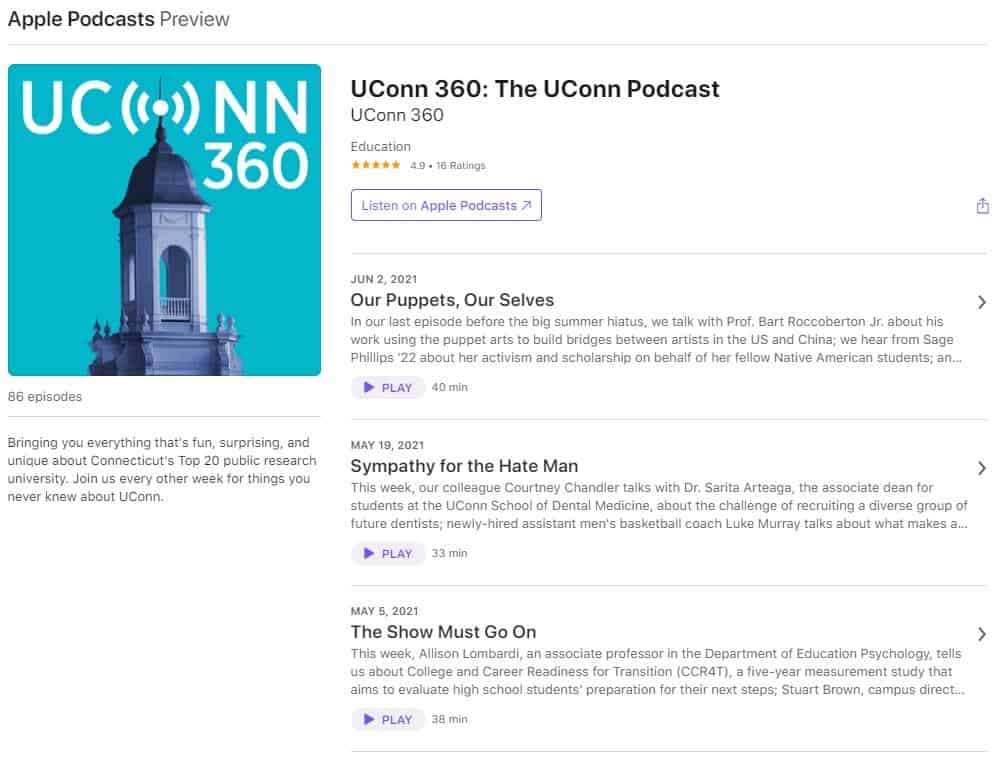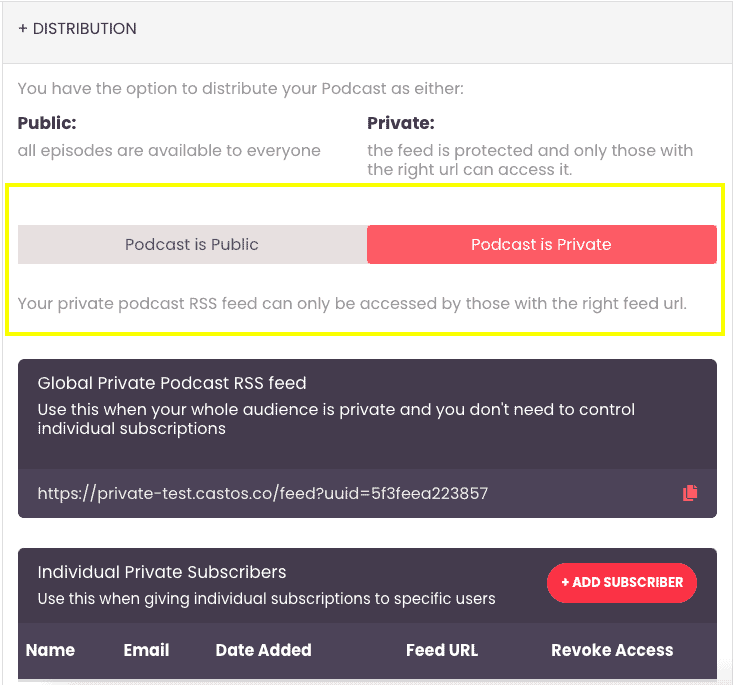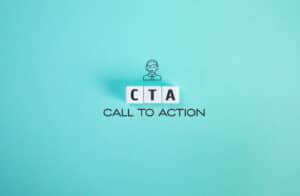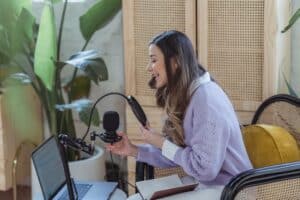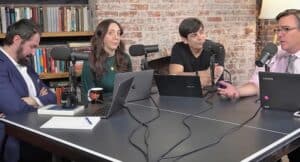The pandemic taught us that education must be flexible. We can’t expect the old models to work forever. Educators and students need to be tech-savvy and willing to try new methods to continue learning, independent of location and time.
In-person learning will always have a place, of course, but other tools are becoming critical to the educational experience. This includes online learning platforms, video conferencing, and even podcasting.
Education podcasts are on the rise. They’re becoming popular with primary schools, high schools, colleges, and universities alike. A podcast for education can make learning accessible, convenient, and engaging without losing the personal touch of an in-person class. They can be used to supplement class material, or in some cases, replace it entirely.
Students only need to subscribe to a podcast for you to push educational content right to their favorite devices. Their podcast listening app will notify them whenever your new episodes are available.
In this article, we’ll talk about how a podcast for education could benefit your classroom. Then we’ll give you some advice to produce a successful show.
The Benefits of a Podcast for Education
A podcast is an effortless way to consume information, which makes them perfect for educational content. Before we talk about creating your own podcast for education, let’s cover the benefits.
1. Your podcast for education content is available 24/7
The biggest advantage of a podcast for education is its constant availability. If you make your lectures available via podcast, students can refer to them whenever they need. For instance, if they’re studying at 2 AM (college students keep weird hours, ya know!), they don’t need to email you and wait for an answer.
2. Students can make up for missed classes
Between jobs, other classes, and personal life obligations, students are busy these days, so the occasional missed class isn’t out of the ordinary. A podcast for education lets them catch up on their own time so they don’t get left behind.
3. Students can listen to your podcast for education anywhere
If a student wants to review your lecture, they can do so from any location. They might listen in the car, at the gym, on the train, or while they cook. If your podcast for education is available on all the popular podcast directories (and it should be!), they can listen to your content right alongside their other podcasts.
4. Educators can miss a class without ruining your schedule
If you (or one of your educators) becomes ill or otherwise can’t make a class, a podcast for education means you don’t have to cancel. Simply record the lesson as you would normally give a lecture and distribute it to the students.
5. You can accommodate students with different needs
If you have any students who struggle with mental, physical, or learning disabilities that prevent them from getting the most value from a live class, a podcast for education could provide them with the resources they need to be successful.
6. Creating podcast for education content is easy
If you already have experience lecturing to a classroom, you’ll find podcasting quite simple. It’s the same process, just in front of a microphone. With a little editing (or none, if you prefer to keep it simple), you can have a professional episode in the same amount of time it would take you to lecture.
How to Create a Podcast for Education
Starting a podcast for education is similar to starting any other kind of show. We recommend reading our podcast starting guide for more information. In that guide, you’ll learn how to plan your show, set up your podcast, get the right equipment, record and edit your first episode, publish it, and launch your show.
Here we’d like to offer some ways to use podcasting specifically for the classroom. Use this to supplement our getting started guide.
Podcasting is a diverse medium, so you have a lot of creative freedom to engage and educate your students. This is not an exhaustive list, of course, but it will get you thinking about how you can use a podcast for education. Use these ideas for inspiration.
Tip
Before you read any further, make sure you know how to start a podcast. Our complete guide tells you everything you need to know. Learn more.
Choose between a public or private podcast
Before you start recording, you’ll need to decide if you want to produce a public or private podcast.
A public podcast is just what it sounds like: a show anyone can access. A random listener might come across your show on Apple Podcasts or your podcast website and give a listen. This extends the reach of your content, but it might not be suitable if you charge for your lessons or otherwise want to keep them private.
A private podcast, however, is a show that’s only accessible by the people you permit. All you have to do is add your private subscribers email addresses and they will receive an invite to your private podcast. They subscribe with a unique RSS feed URL to their favorite podcasting app.
Since you most likely have your students’ email addresses, signing them up to a private podcast is extremely simple – just a quick copy and paste. This method is right for educators who prefer to limit their lessons to just their students.
In Castos, making this distinction is just a click of a button.
Tip
With Castos you can easily create a Private Podcast for your membership site, online course, or community. Learn more about private podcasting.
Offer recordings of your lectures
Why not make your lectures available to your students on demand? A podcast that simply records and publishes each lecture is a key way to keep your students up-to-date if they miss a live lecture or need to refer to something you said previously.
These are also useful for students who can’t capture everything (mentally or in their notes) you say during a typical lecture. A podcast for education gives them a chance to consume your material at their own speed.
Offer supplementary information
You may not have time to lecture as comprehensively as you’d like. A podcast is the perfect way to offer supplementary information that had to be pruned from your live class. For instance, your episodes might include the following:
- Additional commentary on your lectures’ core substance.
- Interviews with experts on the subject.
- Recordings, clips, and readings from other sources.
- Discussions with your students, especially if they have questions.
Create test review sessions
Many educators use test review sessions to help students prepare for upcoming exams. These are especially important for state-required tests. A podcast is the perfect place for this material because students can listen to the review sessions as many times as they like. Any students who can’t attend the live review session will still benefit from it.
Help student with different learning styles
If your class is conducted online (through a platform like Blackboard), you’ve probably noticed that some students struggle with the impersonal format. Some students simply learn better when they can engage with the voice of a living person walking them through the material. A podcast for education gives them this option.
Invite guest lecturers
Think someone else would give a better lecture on a particular topic? No need to bring them into your class! Have them record their lecture as a podcast episode. Use this episode to replace or supplement your typical class.
If possible, make yourself part of the recording as well, if only to stimulate a better presentation and break up the monotony of a single voice. Studies show that listeners are more engaged by dialogue than a simple narration.
Publish student projects
A podcast for education doesn’t need to be hosted by the course instructor. Students can get involved as well. Invite students to record episodes for their projects. This is a fun way to add creativity to their work and make their presentations available to the world. If your course is online, this is a good way to give every student a voice instead of communicating solely through text.
Make key information accessible
Since a podcast is an on-demand publication, it’s a great place to record important information that your students may need to access at any time. This way they always have what they need to be successful and won’t send you a barrage of questions every day.
Here are just a few “housekeeping” items that might deserve their own episode:
- Announcements about schedule or assignment changes.
- Explanations of class rules and policies.
- An overview of the course syllabus.
- FAQs about assignments, projects, or exams.
- An explanation on how to contact and/or visit you.
- Commendations for jobs-well-done.
Start Your Podcast for Education Today
As you can see, a podcast for education can be a powerful tool to enhance the learning experience for your students. It’s an engaging way to deliver your educational content and might set you apart from other educators who rely on more traditional methods.
If you think an education podcast is right for your class, check out our guide on starting a podcast. It will tell you everything you need to know about creating your own show.
